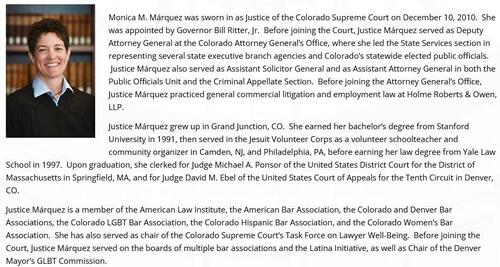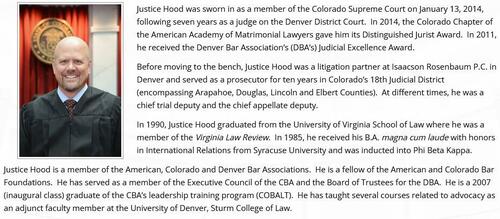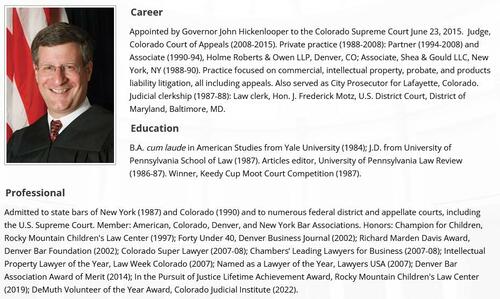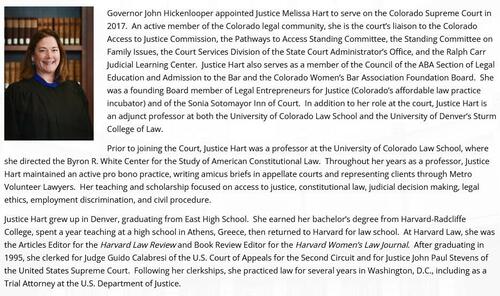The Colorado Supreme Court has disqualified Donald Trump from Colorado’s 2024 presidential election ballot, and in a 4-3 ruling has effectively blocked Trump from seeking the presidency because of his role in the Jan. 6 Capitol attack, citing the post-Civil War-era 14th Amendment to the US Constitution that bans insurrectionists from holding public office. The Colorado case was the first constitutional challenge to Trump’s 2024 run to go through a full trial.
Voters, represented by the advocacy group Citizens for Responsibility and Ethics, had argued he should be barred from the ballot for inciting the Jan. 6, 2021 attack on the US Capitol.
Colorado’s highest court - whose seven-member bench was entirely appointed by Democratic governors - overturned a ruling from a district court judge who found that Trump incited an insurrection for his role in the Jan. 6, 2021, attack on the Capitol, but said he could not be barred from the ballot because it was unclear that the provision was intended to cover the presidency.
In its ruling, the Democrat-controlled court found that Trump engaged in insurrection by inflaming his supporters with false claims of election fraud and directing them to the Capitol. The state justices determined that the office of the president is covered under the insurrection clause, which specifically lists those who previously took oaths to support the Constitution as “a member of Congress,” “officer of the United States,” “member of any State legislature” or an “executive or judicial officer of any State.” The district court had previously ruled that the office of the president was not covered under the clause.
The majority opinion was unsigned but joined by four of the seven justices.
Those who voted for fascism are the following four Democrat-appointed judges:
- Justice Monica M. Márquez

- Justice William W. Hood, III

- Justice Richard L. Gabriel

- Justice Melissa Hart

Three justices dissented from Tuesday’s decision: Chief Justice Brian Boatright, Carlos Samour, and Justice Maria Berkenkotter. Each wrote separate dissents taking issue with how the plaintiffs brought their 14th Amendment lawsuit using a provision of Colorado election law.
Berkenkotter wrote that “the majority construes the court’s authority too broadly.”
“The questions presented here simply reach a magnitude of complexity not contemplated by the Colorado General Assembly for its election code enforcement statute,” wrote Boatright. “The proceedings below ran counter to the letter and spirit of the statutory timeframe because the electors’ claim overwhelmed the process.”
Samour similarly wrote that Colorado’s election law provides no “engine” for such a lawsuit, also noting that no federal legislation existed to enforce the 14th Amendment’s insurrection clause.
“Even if we are convinced that a candidate committed horrible acts in the past—dare I say, engaged in insurrection—there must be procedural due process before we can declare that individual disqualified from holding public office. Procedural due process is one of the aspects of America’s democracy that sets this country apart,” Samour wrote.
Ironically, all this ruling will do is further cement Trump's status as leading presidential candidate as it not only affirms his status as target #1 of the Biden Department of Justice and liberal court system, but will test the Conservative-dominated Supreme Court appeal over its interpretation of the 14th Amendment, which according to many including a Colorado District court, does not apply to the Presidency.
Indeed, as Vivek Ramaswami observed, the 14th Amendment was part of the “Reconstruction Amendments” that were ratified following the Civil War. "It was passed to prohibit former Confederate military and political leaders from holding high federal or state office. These men had clearly taken part in a rebellion against the United States: the Civil War. That makes it all the more absurd that a left-wing group in Colorado is asking a federal court to disqualify the 45th President on the same grounds, equating his speech to rebellion against the United States."
And there’s another legal problem: Trump is not a former “officer of the United States,” as that term is used in the Constitution, meaning Section 3 does not apply. As the Supreme Court explained in Free Enterprise Fund v. Public Company Accounting Oversight Board (2010), an “officer of the United States” is someone appointed by the President to aid him in his duties under Article II, Section 2. The term does not apply to elected officials, and certainly not to the President himself.
The Framers of the 14th Amendment would be appalled to see this narrow provision—intended to bar former U.S. officials who switched to the Confederacy from seeking public office—being weaponized by a sitting President and his political allies to prevent a former President from seeking reelection. Our country is becoming unrecognizable to our Founding Fathers.
The court put its ruling on hold until Jan. 4, so Trump can first seek review from the Supreme Court, which he will. Until then, Trump’s name automatically remains on the ballot until the justices resolve the appeal.
“We do not reach these conclusions lightly,” wrote the court’s majority. “We are mindful of the magnitude and weight of the questions now before us. We are likewise mindful of our solemn duty to apply the law, without fear or favor, and without being swayed by public reaction to the decisions that the law mandates we reach.”
Naturally, Trump’s campaign immediately denounced the ruling.
“Unsurprisingly, the all-Democrat appointed Colorado Supreme Court has ruled against President Trump, supporting a Soros-funded, left-wing group’s scheme to interfere in an election on behalf of Crooked Joe Biden by removing President Trump’s name from the ballot and eliminating the rights of Colorado voters to vote for the candidate of their choice,” a campaign spokesman, Steven Cheung, said.
“We have full confidence that the U.S. Supreme Court will quickly rule in our favor and finally put an end to these un-American lawsuits."
Constitutional law scholar Jonathan Turley, who previously said the case has no solid legal basis, also responded to the decision:
"My first impression remains that same. The court is dead wrong in my view... ...It is striking that the court relies on Schenck v. U.S., where the Court upheld the denial of core free speech rights of a socialist opposing a war. The opinion of the Colorado Supreme Court is so sweeping that it would allow for tit-for-tat removals of candidates from ballots."
Others was just as harsh in their assessment, with many agreeing that this witch hunt will only boost Trump. Some, such as presidential candidate Vivek Ramswami, pledged to withdraw from the Colorado primary unless Trump is reapproved, and urged all other Republican candidates to do the same.
https://twitter.com/DavidSacks/status/1737270486726561917?ref_src=twsrc%5Etfw
https://twitter.com/VivekGRamaswamy/status/1737260590798671982?ref_src=twsrc%5Etfw
Finally, here is Matt Taibbi's kneejerk reaction:
By now most readers will have heard that Donald Trump was disqualified from the ballot in the state of Colorado, by the Colorado State Supreme Court, for what amounts to a criminal offense neither proven nor charged. Fifth Amendment, Schmifth Amendment, apparently.
This is a major escalation of the lawfare phenomenon that’s zoomed from simmer to boil in the seven short years since Trump was first elected in 2016. The glee of #Resistance dolts like Robert Reich and Dean Obeidallah at this decision shows that this was a move dreamed up at the very center of the bubble-within-a-bubble-within-a-bubble that is the blob of the modern Democratic Party. Racket readers, I had a piece planned for later on a quasi-related subject, but I’ll try to get it out in the day or so now.
What a crazy effing country this is…
Here is the Colorado Supreme Court Decision in its entirety.
via zerohedge
